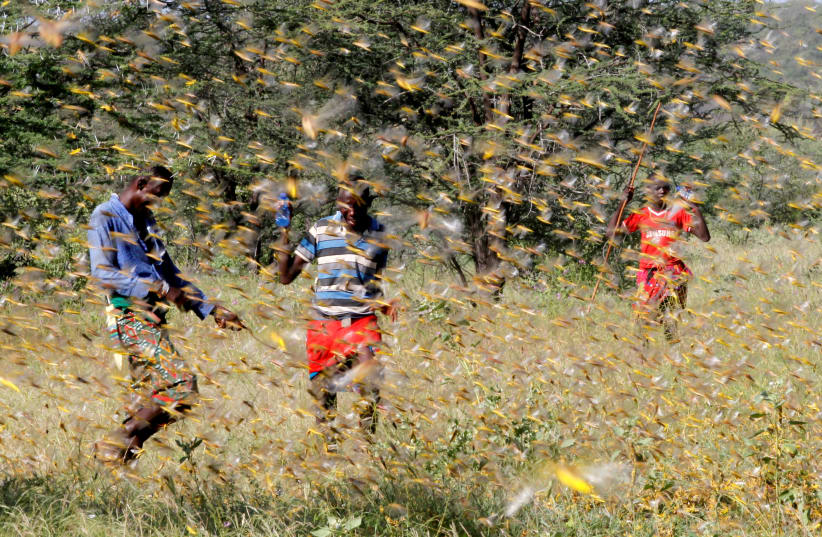Earlier this year, a wave of locusts swept East Africa and parts of the Arabian Peninsula and has since spread to Iran, Iraq Pakistan and India. While the Food and Agriculture Organization (FAO) reported that about 720,000 tons of cereal had been saved from the swarms in 10 countries, the threat still isn't over.
"Our gains have been significant; but the battle is long and is not yet over", said FAO chief Qu Dongyu on Monday. "More people are at risk of losing their livelihoods and worsening food security in the coming months.”
A map by the FAO shows that swarms are expected to spread into West Africa and throughout the Arabian Peninsula in the coming months, with new locust swarms expected to form in June.
While no swarms are currently expected to impact Israel, Jordan is considered "threatened," according to a forecast map by the FAO. In February, Jordan's Ministry of Agriculture announced an "utmost state of emergency" as swarms descended on Saudi Arabia via Yemen. The Ministry also announced that it was closely monitoring regular reports issued by the Locust Forecast Center, situated within the Food and Agriculture Organization. Syria, which also borders Israel, was reportedly preparing for an outbreak as well.
Former Agriculture Minister Tzachi Hanegbi warned at the time that while there was only a low chance that the locusts will come to Israel, the forecast could change and preparations should be made in advance, according to Channel 12 news. An infestation in 2013 caused hundreds of thousands of shekels in damage to Israel's agriculture industry.
Iran may use its military for a second year to help fight locusts which have invaded the south of the country, an Agricultural Ministry official was quoted as saying on Friday, as the swarms threaten to destroy crops worth more than $7 billion. Up to 1 million hectares of land throughout the country may soon be affected by the swarms.
The infestation originated on the Arabian Peninsula in Yemen, with Saudi Arabia being impacted by the swarms as well. In June, Yemen saw an outbreak of desert locusts for the first time in three years. Yemenis took advantage of the infestation as an alternative food source.
A one sq. km. swarm of locusts can eat the same amount of food in one day as 35,000 people, according to the FAO. UN Food & Agriculture Organization locust forecasting expert Keith Cressman explained that a locust swarm that enters a field in the morning can eat the entire field by midday. The insects can travel up to 93 miles a day.
One swarm in Kenya was three times the size of New York City, according to CNN. The number of locusts could grow 400 times by June if not treated. While desert locusts are usually only found in about 30 countries in Africa, the Near East and southwest Asia, they can spread into up to 60 countries over 29 million square kilometres (about 11.1 million square miles) during plagues, according to ReliefWeb.
All of this comes as the coronavirus pandemic continues to impact the world's economy and food availability for many people.
World Food Program executive director David Beasley warned in April that the world is facing a "hunger pandemic" due to the locust swarms, regional conflict and the coronavirus pandemic, among other reasons. 821 million people go to bed hungry every night and another 135 million face crisis levels of hunger or worse, according to Beasley. The WFP found that the coronavirus pandemic has added an additional 130 million people who could be "pushed to the brink of starvation" by the end of this year.
Beasley added that, while there are no famines currently occurring, nations needed to prepare in order to prevent "multiple famines of biblical proportions within a short few months."
In related news in Lebanon, residents "bugged out" over the weekend as swarms of beetles coated the country. "There's a wave of insects in Lebanon rn [right now] and literally insects are flying everywhere we closed all the windows and they're all glued to the windows," wrote one Lebanon-based Twitter user, as others referred to the swarms as "apocalyptic." They come as a series of misfortunes have racked the country, including wildfires, economic issues, food insecurity and the coronavirus, according to Al-Araby Al-Jadeed.
The bugs swarming Lebanon were identified by the Lebanese agricultural Research Institute as the Common Sun Beetle, Black Dung Beetle and Spinola Bug. The beetles are harmless, the Director of the Agricultural Scientific Research Department, Michel Frenn, told the Lebanese MTV news.
Assurances of the harmlessness of the insects didn't calm many residents. "The only thing Lebanon was missing were swarms of insects. Just make the world end already," wrote one social media user, according to Al-Araby.
